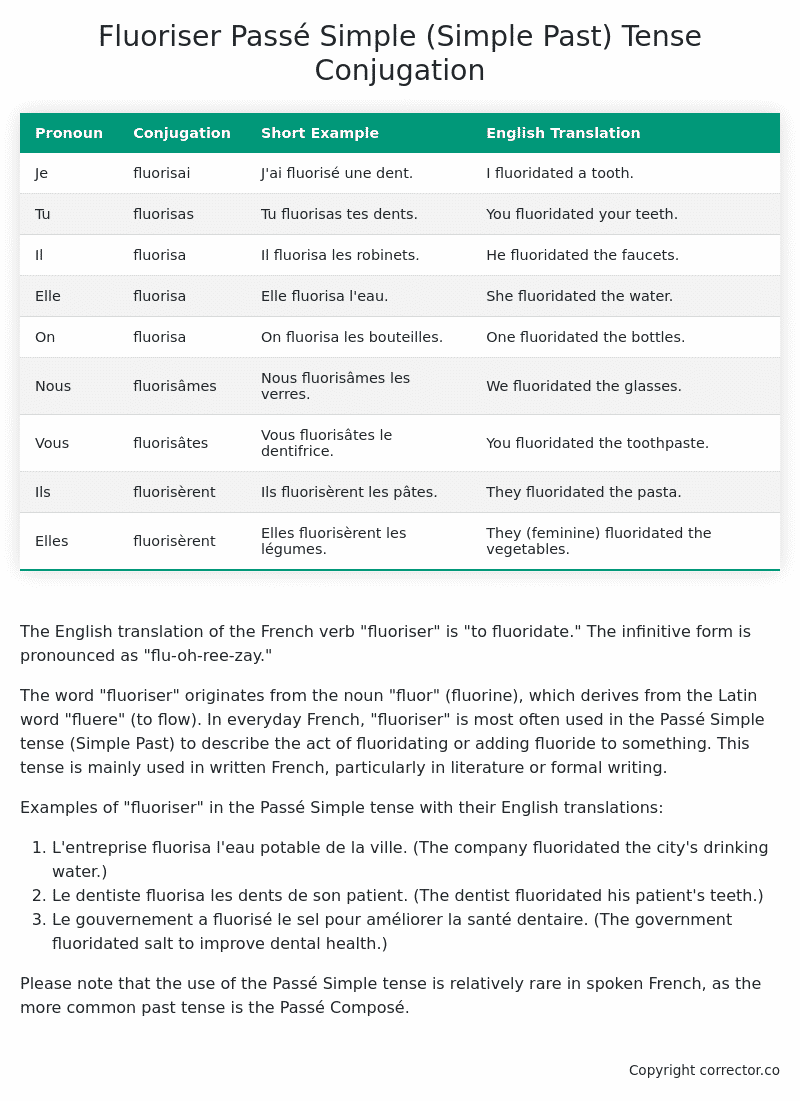Passé Simple (Simple Past) Tense Conjugation of the French Verb fluoriser
Introduction to the verb fluoriser
The English translation of the French verb “fluoriser” is “to fluoridate.” The infinitive form is pronounced as “flu-oh-ree-zay.”
The word “fluoriser” originates from the noun “fluor” (fluorine), which derives from the Latin word “fluere” (to flow). In everyday French, “fluoriser” is most often used in the Passé Simple tense (Simple Past) to describe the act of fluoridating or adding fluoride to something. This tense is mainly used in written French, particularly in literature or formal writing.
Examples of “fluoriser” in the Passé Simple tense with their English translations:
- L’entreprise fluorisa l’eau potable de la ville. (The company fluoridated the city’s drinking water.)
- Le dentiste fluorisa les dents de son patient. (The dentist fluoridated his patient’s teeth.)
- Le gouvernement a fluorisé le sel pour améliorer la santé dentaire. (The government fluoridated salt to improve dental health.)
Please note that the use of the Passé Simple tense is relatively rare in spoken French, as the more common past tense is the Passé Composé.
Table of the Passé Simple (Simple Past) Tense Conjugation of fluoriser
| Pronoun | Conjugation | Short Example | English Translation |
|---|---|---|---|
| Je | fluorisai | J’ai fluorisé une dent. | I fluoridated a tooth. |
| Tu | fluorisas | Tu fluorisas tes dents. | You fluoridated your teeth. |
| Il | fluorisa | Il fluorisa les robinets. | He fluoridated the faucets. |
| Elle | fluorisa | Elle fluorisa l’eau. | She fluoridated the water. |
| On | fluorisa | On fluorisa les bouteilles. | One fluoridated the bottles. |
| Nous | fluorisâmes | Nous fluorisâmes les verres. | We fluoridated the glasses. |
| Vous | fluorisâtes | Vous fluorisâtes le dentifrice. | You fluoridated the toothpaste. |
| Ils | fluorisèrent | Ils fluorisèrent les pâtes. | They fluoridated the pasta. |
| Elles | fluorisèrent | Elles fluorisèrent les légumes. | They (feminine) fluoridated the vegetables. |
Other Conjugations for Fluoriser.
Le Present (Present Tense) Conjugation of the French Verb fluoriser
Imparfait (Imperfect) Tense Conjugation of the French Verb fluoriser
Passé Simple (Simple Past) Tense Conjugation of the French Verb fluoriser (You’re reading it right now!)
Passé Composé (Present Perfect) Tense Conjugation of the French Verb fluoriser
Futur Simple (Simple Future) Tense Conjugation of the French Verb fluoriser
Futur Proche (Near Future) Tense Conjugation of the French Verb fluoriser
Plus-que-parfait (Pluperfect) Tense Conjugation of the French Verb fluoriser
Passé Antérieur (Past Anterior) Tense Conjugation of the French Verb fluoriser
Futur Antérieur (Future Anterior) Tense Conjugation of the French Verb fluoriser
Subjonctif Présent (Subjunctive Present) Tense Conjugation of the French Verb fluoriser
Subjonctif Passé (Subjunctive Past) Tense Conjugation of the French Verb fluoriser
Subjonctif Imparfait (Subjunctive Imperfect) Tense Conjugation of the French Verb fluoriser
Subjonctif Plus-que-parfait (Subjunctive Pluperfect) Tense Conjugation of the French Verb fluoriser
Conditionnel Présent (Conditional Present) Tense Conjugation of the French Verb fluoriser
Conditionnel Passé (Conditional Past) Tense Conjugation of the French Verb fluoriser
Conditionnel Passé II (Conditional Past II) Tense Conjugation of the French Verb fluoriser
L’impératif Présent (Imperative Present) Tense Conjugation of the French Verb fluoriser
L’impératif Passé (Imperative Past) Tense Conjugation of the French Verb fluoriser
L’infinitif Présent (Infinitive Present) Tense Conjugation of the French Verb fluoriser
L’infinitif Passé (Infinitive Past) Tense Conjugation of the French Verb fluoriser
Le Participe Présent (Present Participle) Tense Conjugation of the French Verb fluoriser
Le Participe Passé (Past Participle) Tense Conjugation of the French Verb fluoriser
Struggling with French verbs or the language in general? Why not use our free French Grammar Checker – no registration required!
Get a FREE Download Study Sheet of this Conjugation 🔥
Simply right click the image below, click “save image” and get your free reference for the fluoriser Passé Simple tense conjugation!

Fluoriser – About the French Passé Simple (Simple Past) Tense
Formation
Usage
Narration
Historical Context
Interactions with other tenses
Passé Composé
Imparfait
Conditional and Subjunctive
Summary
I hope you enjoyed this article on the verb fluoriser. Still in a learning mood? Check out another TOTALLY random French verb conjugation!


